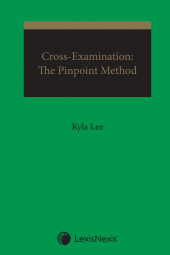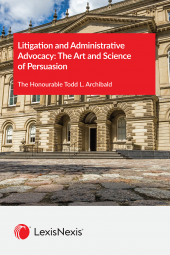Cross-Examination: The Pinpoint Method
“Cross-examination is the most difficult skill to learn, and it is also the easiest to use incorrectly and ineffectively.” Avoid falling into that trap by adopting the pinpoint method of cross-examination today.
One Year Subscription Only Terms
Subscribers receive the product(s) listed on the Order Form and any Updates made available during the annual subscription period. Shipping and handling fees are not included in the annual price.
Subscribers are advised of the number of Updates that were made to the particular publication the prior year. The number of Updates may vary due to developments in the law and other publishing issues, but subscribers may use this as a rough estimate of future shipments. Subscribers may call Customer Support at 800-833-9844 for additional information.
Subscribers may cancel this subscription by: calling Customer Support at 800-833-9844; emailing customer.support@lexisnexis.com; or returning the invoice marked 'CANCEL'.
If subscribers cancel within 30 days after the product is ordered or received and return the product at their expense, then they will receive a full credit of the price for the annual subscription.
If subscribers cancel between 31 and 60 days after the invoice date and return the product at their expense, then they will receive a 5/6th credit of the price for the annual subscription. No credit will be given for cancellations more than 60 days after the invoice date. To receive any credit, subscriber must return all product(s) shipped during the year at their expense within the applicable cancellation period listed above.
Détails des produits
"If there’s one thing this book teaches about the state of legal education, it’s that knowledge of psychology would certainly be valuable. Taking on the persona of a bumbling oaf to get a witness’s guard down, pitting witnesses against each other, and carefully selecting your words to avoid unintentional signals are just a few of the techniques mentioned...The author shares tips on how to manage the “if you say so” witness, the “I don't remember” witness, and even the over-talkers that frequently plague female lawyers. Lee is well versed not only in understanding the typical behaviours of witnesses but also in how to respond to one’s advantage."
Reviewed by Joanna Kozakiewicz, Reference Librarian
City of Toronto, Legal Services Division
See the review in 2022 Canadian Law Library Review 47:1 (pages 22-23)
In the Preface to this new volume, esteemed defence lawyer and author Kyla Lee describes cross-examination as “the most important tool in [her] legal arsenal.” It stands to reason, then, that she has honed her cross-examination skills to such an extent that her approach is as much an art as it is a science, one that she shares in Cross-Examination: The Pinpoint Method.
Innovative. In-depth. Insightful.
Over her years as a criminal defence lawyer, Lee has developed a specific method of conducting a cross-examination that has proven effective time after time. In Cross-Examination: The Pinpoint Method, she uses a series of common scenarios to illustrate how her technique can be used to the benefit of the examiner. In using the metaphor of pins and needles, Lee succeeds in keeping the reader engaged and her content interesting while providing guidance on overcoming the hurdles and challenges that are common in cross-examinations. Topics covered include police witnesses, lay witnesses, expert witnesses, impeachment, proving misconduct, ethics and handling difficult witnesses.
This book will offer valuable direction to trial lawyers who are keen to improve the effectiveness of their cross-examination technique. It will also appeal to judges looking for an interesting read and will be a valuable acquisition for law schools and law libraries.
Table des matières
Chapter 1: Needlepoint: Getting to the point of a cross-examination
1. Why cross-examine?
2. Preparation for cross-examination
3. Completing your preparation
Chapter 2: Dancing on the head of a pin: Ethics in cross-examination
1. Limitations on cross-examination
2. A good faith basis for cross-examination
3. Child witnesses
4. Relevancy
5. When your witness is under cross-examination
6. Obscuring the truth
7. Harassing witnesses
8. Preparing a witness for cross-examination
9. The rule in Browne v. Dunn
10. Inadvertent disclosure
11. Dancing on the head of a pin
Chapter 3: Threading the needle: Setting up your cross-examination
1. Getting to yes
2. The written set-up
3. Laying out your page
4. In the hallway
5. One last consideration
Chapter 4: Pinpoint method: Introducing the style
1. Do not ask questions to which you do not know the answer
2. Be nice
3. Structure each theme like a pin
4. Pit witnesses against each other
5. Re-affirming the favourable facts
6. Affirm the omissions
7. Continuations and adjournments
8. Expert witnesses
9. Think about your words
10. Referring to notes and previous recollections
11. Bad behaviour
12. Implement the style
Chapter 5: Pricking yourself: Handling difficult witnesses
1. The problem of difficult witnesses
2. If you say so
3. I don’t remember
4. Overtalkers
5. Interrupting witnesses
6. Pontificators
7. Extremely accurate witnesses
8. Argumentative witnesses
9. I didn’t know it was important
10. It wasn’t my investigation
11. It’s in my brain
12. I can’t put everything in my notes
13. Officer safety
14. Asking a question in response to your question
15. Exaggerators
16. Rehearsers
17. Unfailingly honest witnesses
18. Difficult witnesses
Chapter 6: Sewing it up: Proof of misconduct
Chapter 7: The final stitch: Ending your cross-examination style
 Lexis Nexis
Lexis Nexis 


